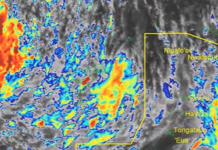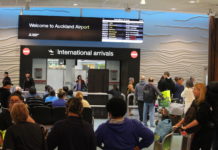By rnz.co.nz and is republished with permission
A major biosecurity operation is underway in South Auckland after an Oriental fruit fly was found in a surveillance trap in a suburban backyard.
Oriental fruit fly Photo: Supplied / MPI / Justin C. Smith
The Ministry for Primary Industries (MPI) confirmed a “single male” fruit fly was found in a surveillance trap in a suburban backyard.
As a result, restrictions are set to be enforced on the movement of fruit and vegetables with trapping and testing stepping up around the Papatoetoe and Mangere areas.
Checks of the other 187 traps within this zone did not find any fruit flies.
The insect is considered one of the most “destructive and widespread” of all fruit flies, that can jeopardise the country’s produce exports if found in New Zealand.
Biosecurity NZ spokesperson Mike Inglis said details of the controls and the “exact area affected” will be outlined on Sunday, once an initial investigation had been completed.
“In the meantime, we ask that people who live and work in the suburb not take any whole fresh fruit and vegetables out of your property.”
Inglis said previous experience when eradicating different fruit flys suggested other insects could be found.
“It is important we move quickly, look for any others and eradicate them,” he said.
“We will be ramping up trapping and testing, with daily checks in a 200-metre zone from the original find and three daily testing in a second zone out to 1500m.”
The Oriental fruit fly is native to Asia but has now spread to many warmer countries, especially as the climate warms.
Adult flies lay eggs into fruit and the young stages (maggots) feed inside the fruit, causing it to rot and become unmarketable.
The Oriental fruit fly maggots can feed on 300 different fruit and vegetables, particularly apple, guava, mango, peach, and pear.
There have been 12 incursions of different fruit flies across Auckland and Northland since 1996 and had all been successfully eradicated courtesy of the work of Biosecurity New Zealand, the horticulture sector, and local communities, Inglis said.
MPI’s lure-based surveillance trapping network involves about 7900 throughout the country.
“By setting traps for these pest insects, we are able to find them early, know exactly where the problem is, and respond quickly and effectively,” Inglis said.
The fruit fly poses no human health risk, but there would be an economic cost to the horticulture industry if it were allowed to establish here.
“The capture of a single male does not mean we have an outbreak. However, while we do our checks for any other fruit flies, we need community help to prevent any possible spread,” Inglis said.
“As a precautionary measure, we’ll be putting legal restrictions in place on the movement of fruit and vegetables out of the area where the fruit fly was found.”
Biosecurity staff will be out on Saturday providing local residents with information.
“You may notice increased activity in the neighbourhood as we go about inspections and trapping.
“Our field officers may ask to look at fruit trees on your property.
“They will always show you a form of official identification and will only enter your property with your permission.”








